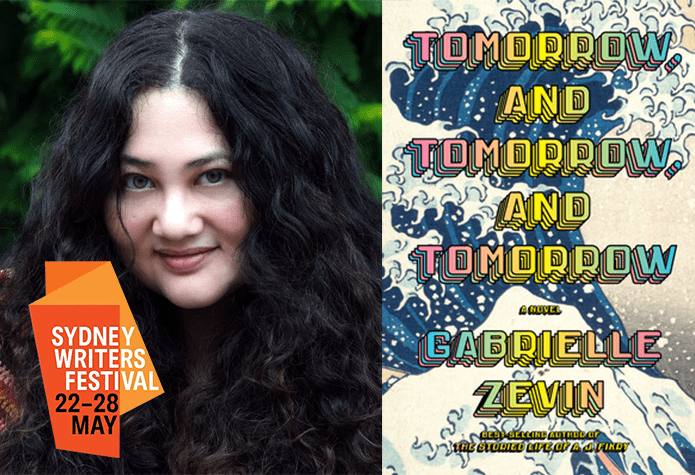When Gabrielle Zevin pitched her 2022 novel, Tomorrow, and Tomorrow, and Tomorrow to her agent, she described it as “love, art, video games, time and failure”. These themes inspired much of the fascinating conversation at her Sydney Writers’ Festival event, held earlier this week at NIDA’s Parade Theatre.
When asked about the writing process of the novel, Zevin explained that “it was fun writing this novel. I just had to recalibrate my definition of fun.” Throughout the conversation, the moderator Melanie Kembrey and Zevin offered an authentic and engaging discussion of the book and the world around it. Laughing off the passing of a note asking the speakers to angle further towards the audience, and a magic appearance of a crew member to fill up the two previously empty water glasses on the table, the event felt intimate — it was easy to forget that there was an entire theatre worth of people around me.
Introduced to computers at a young age, Zevin did not perceive computing as foreign, instead understanding technology as a language that can be used to communicate ideas. Zevin described how technology and the humanities were not opposites, instead connected and influencing each other: in her eyes, video games sit at the intersection between art and technology. Wanting to give this often diminished topic a sense of grandeur, her novel’s title derives from a soliloquy in Shakespeare’s Macbeth. Zevin joked with the audience that you couldn’t spoil Macbeth at this point, saying “You’ve had 400 years.”
“You never really know which idea you are going to follow,” explained Zevin. When asked about the influence of an audience on a creator’s work, Zevin described how when one writes their first book, they have a certain kind of plausible deniability about their audience. After that, it is harder to not be influenced by thinking about the audience. With the pandemic prompting a reconsideration of the impact of her own thoughts and concerns about the audience, Zevin wasn’t particularly confident that Tomorrow, and Tomorrow, and Tomorrow would be successful. Evidently, her fears did not come true: Tomorrow, and Tomorrow, and Tomorrow has since become a New York Times and IndieBound bestseller, and a favourite on bedside tables all over the world.
Stylistically, the chapters of Tomorrow, and Tomorrow, and Tomorrow include varied perspectives, forms and timeframes often changing the position of the reader throughout the novel, even delving into a divisive (but effective) experiment with second person narration. Zevin described how the varied structure was used to capture the way that time works. Managing this complicated timeline was made easier by Zevin’s writing process, which involves reading everything up to the moment that she would be writing — in order to best simulate the experience of the reader’s experience. For the chapter written in second person, Zevin discussed how she was keenly aware that this had to be done perfectly, or readers would likely respond negatively to it.
Success is not always a good thing. Zevin explained that failure, instead of success, is a much more creative space to inhabit. When you succeed, you are asked to repeat the thing that you did the first time. When you fail, you — at least hopefully — won’t repeat that exact thing you did before. Zevin stressed to the audience that the best thing you can do for yourself is to get more comfortable in the creative place that is failure: “To be hopeful or positive in this world, at least for me, takes great intellectual effort.”
Zevin was very transparent about the impact that money has on creativity, both in terms of the book — discussing the influence of class on the experiences of Sadie and Sam — and the actual practice of creating in the real world. Zevin explained that people repeat ideas that they think to be true which then influences how money is spent which then influences what is getting made, and the cycle continues. Despite writing adult fiction during the period, Zevin recalled how writing for children — which is predominantly done by women — is often used as an excuse for people to say that the skill of those who write for young people is lesser than authors of literary fiction.
Ultimately, Zevin’s Sydney Writers’ Festival event was a fascinating insight into Tomorrow, and Tomorrow and Tomorrow, and the worlds of technology, art, video games and commerce that exist in and around it.





